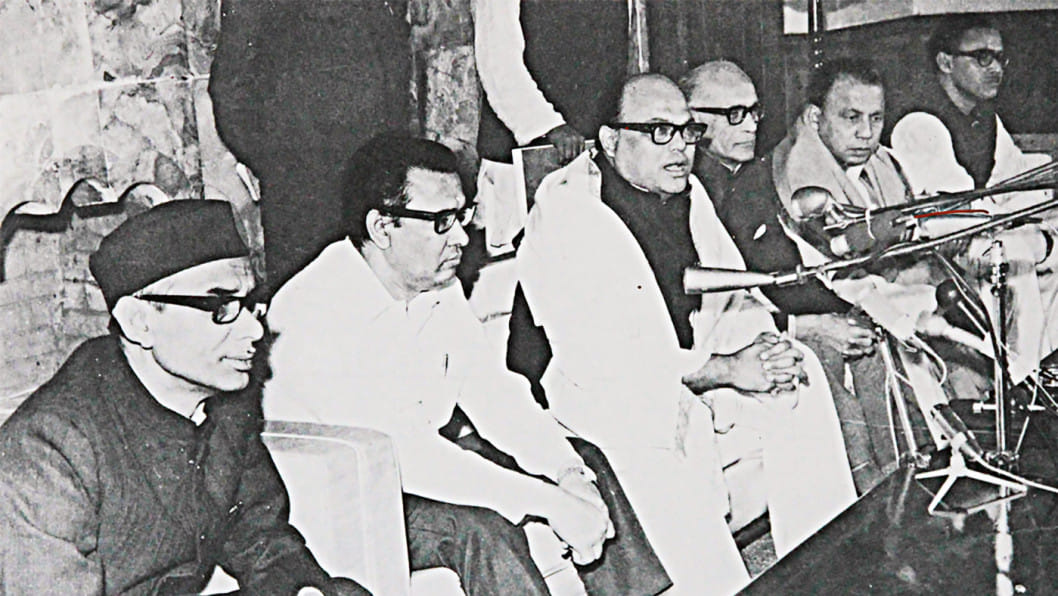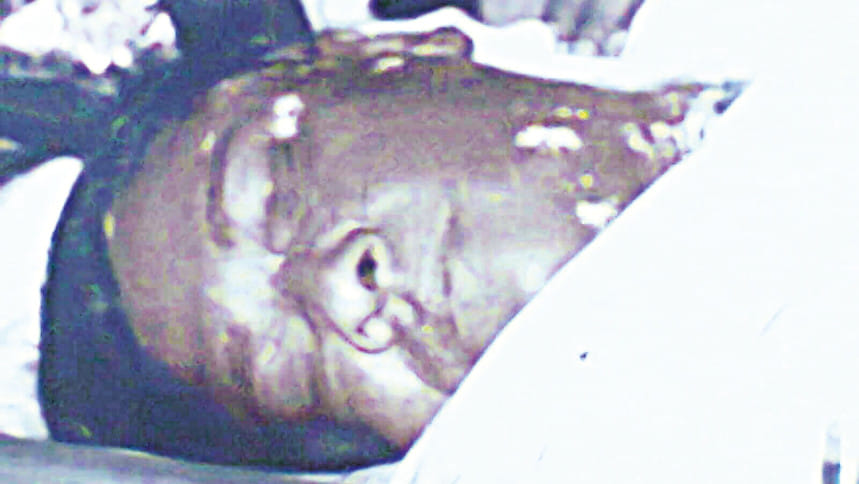The night of unspeakable horror: A survivor’s account
"Ding dong ding dong," an irregular bell continued to resound within Dhaka Central Jail on a Monday at around 3 a.m. This unusual and disquieting disturbance echoed throughout various cells and wards, catching the incarcerated off guard. A sense of apprehension and unease swept through the prison, as such unruly bell tolls typically heralded untoward incidents. Typically, this time within the prison was reserved for the peaceful slumber of its residents, who lived confined within imposing, towering walls.
Approximately forty-eight years ago, during the tumultuous period following the tragic assassination of Bangabandhu Sheikh Mujibur Rahman, this jail housed a number of individuals considered highly dangerous. It was a time marked by the oppressive rule of a Martial Law regime, characterized by arbitrary and oppressive restrictions, creating an environment where the law of the jungle prevailed. Under this administration, one of the fundamental principles was the detention of anyone suspected of opposing its interests. Those in power could subject individuals to indefinite, trial-free preventive detention. Regrettably, I found myself among the detainees, perceived as one of the most dangerous criminals with potential involvement in seditious activities.
Suddenly, everything fell into total silence, dissipating into thin air. Perhaps a minute or two passed when I heard Monsur Ali's voice, groaning, desperately pleading for water.
As a result, I was confined to a small room within a newly constructed building, referred to as "90 cell," an annex of the central jail. This cell, measuring approximately 8'x8', served as my isolated confinement. I entered this space with uncertainty about my destiny and future. The newly constructed building, alongside a century-old semi-pucca concert hall, collectively known as the "New Jail" within the Central Jail premises, still stands today. However, it remains entirely abandoned since the relocation of the old jail to Keraniganj.
The century-old concert hall, once a venue for Nawabs of Dhaka to revel in dance and song performances by professional female artists, underwent a transformation into a three-room prison after Bangladesh's independence in 1971. Within these rooms, the four national leaders were interned, and it was in room number one that the notorious November 3 jail killing took place.
I, along with around 50-60 other prominent political figures, was detained in these three rooms. The authorities were apprehensive that we might orchestrate a counter-rebellion, given that the four national leaders, following the assassination of the Father of the Nation, possessed the potential to mount a counteroffensive. This mindset led the coup leaders to confine most political prisoners within the secure confines of Dhaka Central Jail, situated in the heart of old Dhaka City.

Among our notable companions were individuals such as Syed Nazrul Islam, Tajuddin Ahmed, Captain Monsur Ali, AHM Qamaruzzaman, Sk Abdul Aziz, ATM Syed Hossain, Abdus Samad Azad, Amir Hossain Amu, Mofazzal Hossain Chowdhury Maya, Mohiuddin Ahammed, Gazi Golam Mostafa, Dr. Abdul Matin Chowdhury, Khondoker Asaduzzaman, HT Imam, Motiur Rahman Minister, Anwar Jong, TCB Chairman Motiur Rahman, Consumer Supply Corporation Chairman Atiar Rahman, and others.
As a witness to the trial of the jail killing on November 3, 1975, it is my solemn duty to recount this gruesome horror story for the sake of future generations. This responsibility holds particular significance for me, as I was the sole individual sitting within a mere ten yards of the site where the killing occurred, enclosed by the imposing walls of the new jail. I was fully awake, positioned within earshot of every spoken word, the echoing footsteps, and the clatter of moving boots. I could discern each dong and the metallic clank of heavy doors being opened and closed.
Finding them lying in a pool of blood, my heart sank, and it felt as though it had stopped beating. Four bodies, each covered in injuries and smeared with thickly clotted blood, were indeed a ghastly sight.
Following the stroke of midnight on November 3, 1975, the night guard responsible for the bell, as previously mentioned, commenced the persistent ringing, starting at approximately 3:00 a.m. The echoing sound persisted nearly until daybreak. At this seemingly unusual hour, a substantial contingent of jail staff, led by Jail Superintendent Aminur Rahman, gathered near the first cell of the new jail. Their conversation was loud enough for us, the inmates of the recently constructed building, to hear. The building consisted of small cells designed for solitary confinement, measuring 8x8x9-10 feet, with a small open toilet space of 3x3 feet, hardly adequate for sitting with closed elbows.
Upon hearing the commotion of these visitors, I stood on the toilet wall to elevate myself and peer through the opening. However, the opening was narrow, located at the very top of the wall, making it challenging to maintain a standing position and preventing me from seeing anything below eye level. Consequently, I descended, but the noise was clearly audible. Along with the footsteps, Aminul issued instructions to unlock the cell gates. The clamor of these gates being unlocked was deafening, as heavy metal rods, locks, and bunches of keys collided and clashed. The gates to all three rooms were opened and closed in a controlled sequence, with many individuals moving to and fro. In my estimation, this operation took perhaps half an hour. When they had completed their task, they all dispersed, leaving behind an eerie silence.
Almost immediately after the group of officials had departed, and the echoes of their footsteps had dissipated, I heard the sound of multiple footsteps hastily approaching the room that the jailer had vacated. In no time, pandemonium erupted as several Chinese automatic SLRs opened fire in unison, their bullets resounding at point-blank range. The once-horrific moans of victims gave way to an eerie and gradual silence.

Before any shots were fired, I heard Tajuddin's voice saying, ÒGB wK Ki?Ó Once the shooting commenced, it seemed to continue endlessly, creating an eternal inferno from my perspective. The volley of bullets, fired at point-blank range, struck the leaders with ruthless speed and intensity. Those that missed their targets hissed cruelly as they struck the walls and the roof. Even the sturdy metal rods were damaged at their edges. The metallic clanging resembled a relentless hail of gunfire. The horrifying echoes of bullets colliding with the harsh, thick metals assaulted our ears, rendering our senses numb.
In a matter of moments, I heard the boots of a group of fleeing soldiers, swiftly fading into the distance. Suddenly, everything fell into total silence, dissipating into thin air. Perhaps a minute or two passed when I heard Mr. Monsur Ali's voice, moaning and groaning, desperately pleading for water.
The final act of this tragedy was yet to unfold. After a few more minutes, the sound of military boots returned, growing louder as they approached room number one. Seconds later, the sound of bayonets slicing through flesh reached my ears.
I had experienced the horrors of the liberation war and faced the well-armed Pakistani army, exchanging gunfire. I had even used some Chinese captured weapons and bayonets. Thus, the sound of bayonets cutting through human flesh was not foreign to me. The assailants repeatedly hacked at each victim. When they were certain that the victims were beyond help, they departed in haste, one of them lagging behind. The leader urged him to hurry, saying, "Hamid, hurry up."
The resounding noise of a group of soldiers running away quickly dissipated into the abyss of time. A heavy shroud of silence enveloped the prison grounds and its surroundings. It felt like the stillness of a graveyard. We were all left speechless, with not a word to be heard and no movement to be seen. The heavens, the blue sky, the ashen clouds, the drifting nimbus, the lightning, the wind, everything came to a standstill. Even the raindrops, which had been falling heavily, suddenly ceased, as if they were fearful of the ruthless killers. In those moments of profound grief and hallucination, all living beings seemed to halt, as if they too were witnessing this painful vivisection.
Amid this eerie silence, while all the inmates in the jail were rendered speechless and motionless, the Muazzin from the minaret of the Chowk Bazar mosque, situated nearby, began the call to prayer, the Azaan. The deep and resonant recitation of "Allah ho Akbar, Allah ho Akbar," accompanied by "Aas salatu khairum minan naum," cast a profound sense of desolation upon the prisoners. Along with the Azaan, raindrops started to fall, as if they were washing away the filth and scars of this cruel episode in human history.
As the darkness of the night gave way to the dawn, and the morning sun's rays began to pierce through the dark clouds above, a prison guard, dressed formally, approached my cell. Without any prompting from me, he announced, "চারজন শেষ." I asked him, "who?" He replied, "দুই জন এক নম্বরের, আর দুই জন দুই আর তিন নম্বরের।" "নজরুল ইসলাম, তাজউদ্দীন, কামারুজ্জামান আর মনসুর আলী." He then left in a hurry. After a while, as he was walking back through his duty area, he returned and said, "আমরা যখন জেলের গেট খোলাখুলি করছিলাম তখনই এক ফাঁকে ওরা ঐ অন্ধকার বারান্দার নীচে লুকাইয়া দাঁড়াইয়া ছিল। জেল সুপার দলবল লইয়া চইলা যাওয়ার একটু পরেই ওরা দৌঁড়াইতে দৌঁড়াইতে আসে." Thus the heinous, cruel, catastrophic, and horrifying murder was executed by a group of assassins dispatched by Moshtaq.
With the killing spree over, wild rumors began flooding Dhaka city. The central issue that circulated was that many detainees had been killed along with the four national leaders. As I was a dangerous detainee in the eyes of the martial law authority, my family members grew worried. So, on the next midday, November 4, my elder brother came to the central jail gate to inquire about my well-being. As a visitor, I was taken to the gate, and we met. He was relieved to find me in good shape. We discussed current state affairs and parted ways when the guard announced, "Time's over." I returned to my solitary cell.
As the dead bodies still lay on the floor of room 1 of the new jail, I ventured towards the first room. It was a veritable hell of a sight to see, a gory horror in a sordid battlefield. I was dumbfounded to witness the plight of my leaders, who had been my virtual comrades in arms since the beginning of the war of liberation in March 1971. Finding them lying in a pool of blood, my heart sank, and it felt as though it had stopped beating. Four bodies, each covered in injuries and smeared with thickly clotted blood, were indeed a ghastly sight. Memories of the long and arduous journey undertaken by Mr. Tajuddin and Barrister Amirul Islam through my wartime territory, from Jhenidah to the Indian border post of Changkhali and its continuation to Calcutta, came flooding back into my memory. Recollections of subsequent meetings with Mr. Monsur Ali, Kamaruzzaman, and Syed Nazrul Islam in Boidyanath tola, Meherpur Mango grove, for the epochal ceremonial presentation of Bangladesh's first independent government, under my salute, started replaying like slides of a cinema—a series of indelible memories.
Mahbub Uddin Ahmed, Bir Bikram, was in charge of presenting the guard of honor to the acting president of the government-in-exile, Syed Nazrul Islam, at the oath-taking ceremony on April 17, 1971.

 For all latest news, follow The Daily Star's Google News channel.
For all latest news, follow The Daily Star's Google News channel. 


Comments